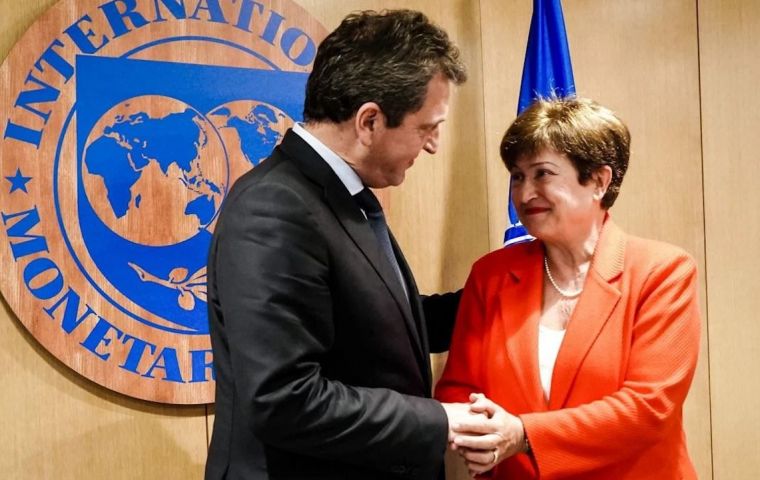MercoPress. South Atlantic News Agency
Talks between Argentina and IMF “progressing constructively”
 Argentina hopes the IMF makes all of its 2023 disbursements next month
Argentina hopes the IMF makes all of its 2023 disbursements next month The International Monetary Fund (IMF) admitted negotiations with the Argentine Government were still going on toward a redesigning of the country's program in light of the present drought, while Casa Rosada sources agreed that “the conversations” were “progressing constructively.”
“The IMF and the Ministry of Economy teams continue to work constructively to strengthen the Fund-supported program in the context of the very severe drought. Discussions are ongoing virtually and the teams are expected to have several meetings this week to move forward with the program,” said a spokesperson for the global agency.
The Argentine team, headed by Deputy Economy Minister Gabriel Rubinstein and chief advisor Leonardo Madcur, began to virtually analyze the redesign of the program with the IMF, hoping to advance most of the 2023 major disbursements (around US$10.6 billion) to next month.
The International Monetary Fund (IMF) spoke on Monday about recalibrating the current agreement with Argentina after the government of Alberto Fernandez raised the need to modify the goals given the impact of the drought on the economy. The agency admitted “progress has been made.”
The lack of rainfall caused a slowdown in exports of primary products and foreign currency inflows to the country through foreign trade worth roughly US$ 20 billion.
Meanwhile, IMF Managing Director Kristalina Georgieva warned last week that the world was on the edge of geo-economic fragmentation, which she believes could add more “cold water” to already anemic global growth. In a video appearance at the Brussels Economic Forum, Kristalina Georgieva called for cooperation at a time when growth across the globe is extremely weak by historical standards.
“After decades of increasing global integration, there is a growing risk that the world may split into rival economic blocs,” the IMF chief said. “And that’s a scenario that would be bad for everyone, including for people in Europe.”
The IMF projects growth to remain around 3% over the next five years, the lowest medium-term forecast in more than three decades. “And yet, central bankers cannot take their eyes off the ball until stubborn inflation is firmly under control,” Georgieva pointed out. “The required monetary tightening is weighing on growth and exposing some financial vulnerabilities.”
The IMF boss had previously said that the shocks of the past few years, including the Covid pandemic, the Russia-Ukraine conflict, and a spike in interest rates after years of loose monetary policy, have been a drag on the global economy.




Top Comments
Disclaimer & comment rulesCommenting for this story is now closed.
If you have a Facebook account, become a fan and comment on our Facebook Page!